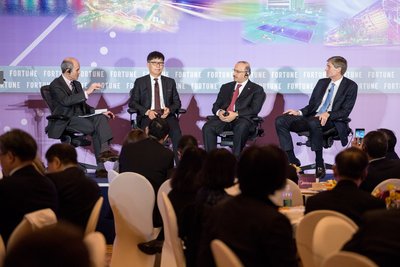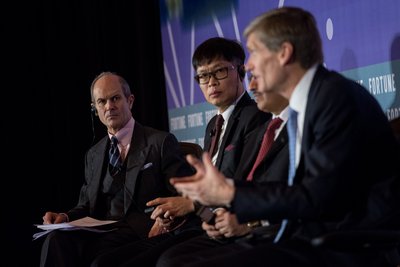GUANGZHOU, Dec.8, 2017 /PRNewswire/ -- During the 2017 Fortune Global Forum held in Guangzhou, China on December 6-8, economists and scholars from home and abroad, as well as senior executives from Fortune 500 companies, had a thorough discussion over the topics of globalization, technological innovation and corporate leadership under the theme "Openness and Innovation: Shaping the Global Economy". Over the "Going Global Strategies: Cross-Border Mergers, Partnerships, and Organic Growth" breakfast meeting presented by Midea Group, Geoff Colvin, senior editor of Fortune and renowned economic commentator, moderated the discussion attended by Mr. Paul Fang, Chairman & CEO of Midea, Mr. J. Erik Fyrwald, CEO of Syngenta International and Yousef Al-Benyan, Vice Chairman and CEO of SABIC. Over the discussion, senior executives of these Fortune 500 companies shared their views on multinationals going global and their business philosophies.

Midea Group made #450 on the Fortune 500 Companies list in July this year, climbing 31 places from 2016. With a market value of over $45 billion, it is the only household appliances manufacturer in China to have entered the list two years in a row. During the breakfast meeting, Mr. Paul Fang, Chairman & CEO of Midea Group, answered how Midea attained success in the global market amidst sluggish industry growth. The private enterprise not only managed to maintain, but even improve and upgrade their production and operations. He also discussed innovative ways that the company has used to partner with enterprises from Germany, Japan and Italy, achieving cross-cultural and cross-regional global operations.
"A truly globalized company should strategize based on their insight on the global trend. We believe that the society is moving towards an era of optimal human-machine interaction, and what Midea has to do now is to constantly stay ahead," said Mr. Fang. The advancement in mobile Internet, big data and cloud computing is constantly empowering society in many different aspects. The future of manufacturing enterprises will inevitably feature human-machine interaction, and impact our daily lives too. This is exactly why Midea started to explore the optimal interaction between man and machine in various life scenarios several years ago and apply these findings to our production. Midea has been dedicated to establishing an innovative social ecosystem where human and machines, supported by its products, coexist in a convergent and collaborative way. This way, people may revert their focus to innovation and the enjoyment of the essence of life. To this end, Midea has long been advocating the strategy of "smart home and intelligent manufacturing".
Midea's "Openness": Cross-industry Convergence for the Integration of a Global Industrial Chain
Having started as a conventional household appliance manufacturer, one needs to not only quickly adapt its business strategy to integrate the mobile Internet, but also be proactive, open and collaborative in its intelligent manufacturing process to fulfil its vision of initiating the development of an optimal human-machine ecosystem. "Internet of Everything" is the future of an intelligent society. In a world with no boundaries, almost all tools that people use would be interconnected via the Internet. Household appliances can not only be remotely controlled, but supported by big data, such appliances can even learn and auto-adjust parameters to best adapt to people's living and working habits. Embracing the Internet is the first and paramount step that Midea has taken on its journey to an intelligent era, which would be made possible by aligning with smart mobile terminals.
After the quick transformation of its conventional manufacturing process into automation and digitization, Midea's production and sales functions are now interlinked, resulting in an Internet-based operation and management, producing massive production-related big data. Also, Midea's acquisition of KUKA, one of the four major robot manufacturers in Germany, and the Israeli company Servotronix have further consolidated the Group's technological strength and product portfolio in motion control and automation solutions, thus enhancing its industrial mapping in robotics. The most important thing to note is the rationale behind these acquisitions; Midea did not acquire such companies only for the sake of their technologies. Rather, it wishes to partner with these industry leaders to redefine an industry platform that is adapted to smart living and intelligent manufacturing and to explore more robot applications.
To that point, Midea has recently been active in pursuing more strategic partnerships with industry top-players such as Alibaba, JD.com, Huawei, Country Garden and Guangzhou Pharmaceutical. With such cross-industry integrations, Midea Group has broken the deadlock often faced by conventional household appliance manufacturers. By embracing the Internet, the Group has now managed to connect both upstream and downstream processes along the value chain of household appliances and HVAC systems, establishing a new globalized industrial pattern. Midea's openness is demonstrated in its business philosophy of not confining itself in the current household appliance market. Cherishing a vision for the future, the Group has worked with its many partners to explore the infinite possibilities in human-machine collaboration.
Midea's "Innovation": Consolidating an Organic Growth through Business Model and Technology
Many multinationals choose to use mergers and acquisitions in their market expansion and financial growth plans, which is ultimately not a sustainable solution. Instead, development of disruptive technologies is the key to sustaining a business. In fact, Midea's recent technological advancements and breakaway from its past development philosophy is the result of its core driving force: innovation.

In the recent two years, the world is witnessing a technology-centered reallocation of resources. Amidst the fierce competition among major international manufacturers, where "Industry 4.0", "mobile Internet" and "AI" and other related technologies sit at the core, Midea has already long been considering the question of effective innovation. This is why Midea did not choose to obtain core technologies through acquisition alone, but has constantly been readjusting its R&D strategy since 2011. With a generous investment in talent and resources, Midea has expanded its global R&D footprint and sped up its R&D transformation, thus paving the way for greater future development possibilities.
Midea's investment in R & D has maintained an upward trend over the past five years, now totaling $3 billion. Altogether twenty R&D centers, eleven in China and nine in seven other countries, have been established. These institutes, some located in the United States, Japan, Germany, Singapore and Austria, are joined together for global collaboration. To better prepare for the medium-and-long-term roadmap, Midea has also established a Central Research Institute, whose efforts are dedicated to the research of fundamental, disruptive and general technology in three years' time and beyond. At the product level, collaborative R&D between the production and the R&D centers would make innovative product application possible. Over the past five years, a total of 32,000 patent applications have been filed by the Group. With a total investment of €745 million, the highest among the household appliance manufacturers in China, Midea ranks 175 on the World Top 2500 R&D Investors released by the European Commission in early 2017. It is Midea's belief that the innovation of core technology is the key driving force behind the organic growth of an enterprise.
Through open exploration and innovation practices, Midea has consolidated a cross-industry business model that is tailored to the new human-machine ecosystem, and built core technology strength secured by its solid R&D capabilities. In Midea's vision for a globalized future, even greater value could be achieved when these aspects are well-integrated.
Photo - https://photos.prnasia.com/prnh/20171208/2010112-1-a
Photo - https://photos.prnasia.com/prnh/20171208/2010112-1-b